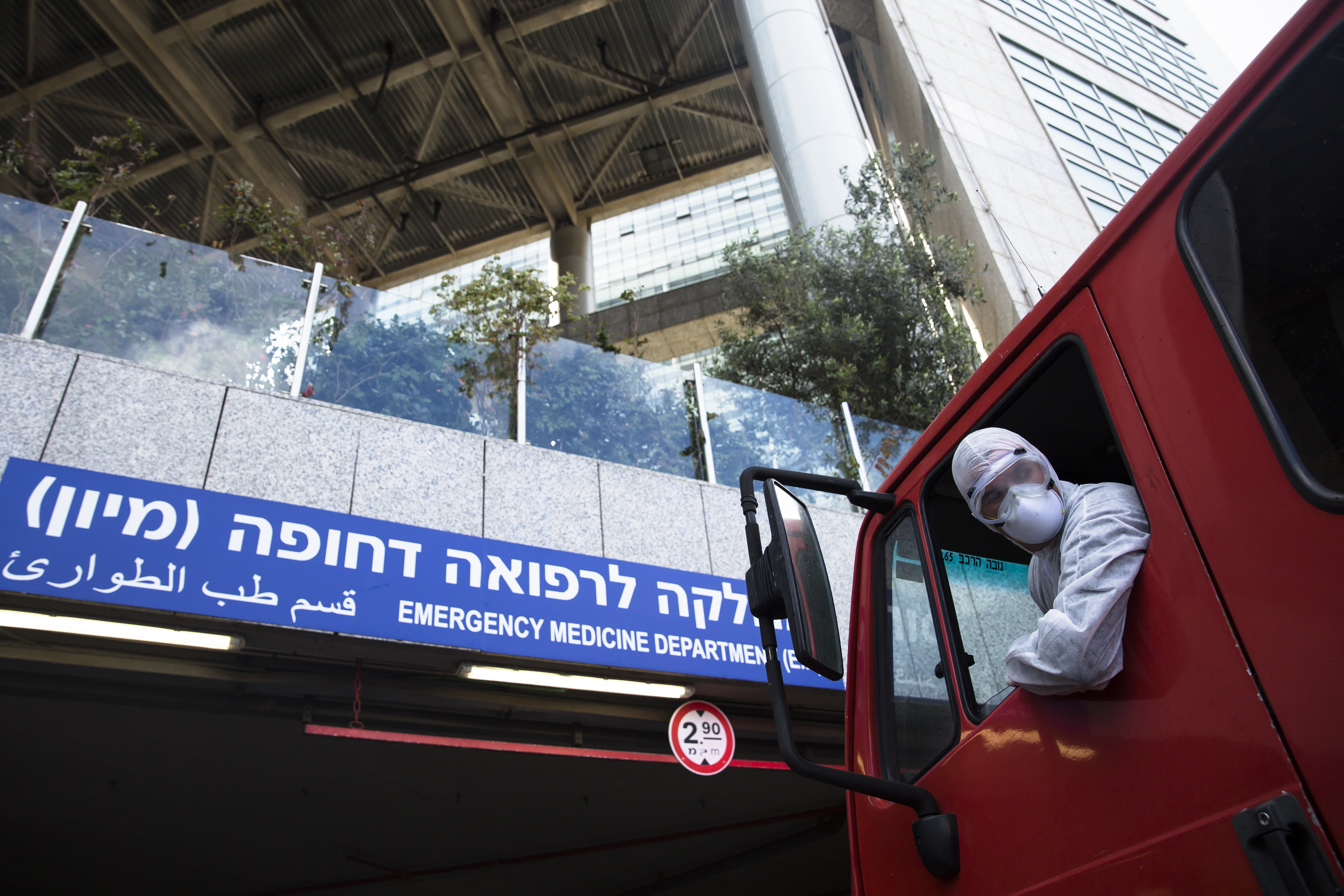 TEL AVIV, ISRAEL – MARCH 20: An Israeli Fire Department crew man drives a fire truck before spraying disinfctants to sanitize the entrance to Tel Aviv’s Hospital Emergency Department on March 20, 2020 in Tel Aviv, Israel. Number of coronavirus in Israel continues to jump, after over 200 new cases have been diagnosed with COVID-19 in the past 24 hours. (Photo by Amir Levy/Getty Images)
TEL AVIV, ISRAEL – MARCH 20: An Israeli Fire Department crew man drives a fire truck before spraying disinfctants to sanitize the entrance to Tel Aviv’s Hospital Emergency Department on March 20, 2020 in Tel Aviv, Israel. Number of coronavirus in Israel continues to jump, after over 200 new cases have been diagnosed with COVID-19 in the past 24 hours. (Photo by Amir Levy/Getty Images) Many years ago, some Israelis were among a group of backpackers abducted by terrorists in Asia. I forgot what country this occurred in, but I vividly remember watching TV at home when the initial report alleged that two of the backpackers had charged the terrorists and had been fighting with them. My son immediately said, “It must be the Israelis.” Indeed, few hours later, one of the Israelis was interviewed by the local TV stations. When asked how they had dared do such thing, he answered: “We wouldn’t be Israelis had we not tried.”
This can-do attitude is engrained in the Israeli DNA. We are used to fighting enemies on the battlefield, and always win even if we are taken by surprise, like, for instance, the Yom Kippur War. We chase terrorists who hide among civilians, targeting the suspects while trying to spare the innocent. We overcome economic crises like the one in 2008, emerging stronger than before. The one thing we can’t bear is standing idly by and letting events take their course without trying to shape them.
The coronavirus, however, seems to be an exception simply because this enemy is so elusive. Therefore, when it began to spread among us, we were confused: Should we paralyze our economy to overcome the coronavirus? Are we taking the right measures? Why does something that works in one country not work in another?
Then the Israeli can-do reflex came to life. Forget about the strange way Israeli Prime Minister Benjamin Netanyahu has been managing the crisis, not handing it over to the Homeland Command, which specifically had been created to deal with national crises (hint: he doesn’t want to share the credit with Naftali Bennett, Minister of Defense). And forget about the political mayhem, where after three election campaigns Israelis can’t form a decent government. It is the Yom Kippur War all over again: When the leadership failed, it was the officers and soldiers who saved the day.
So first of all, disregarding the uncertainties, Israelis asked themselves what they could do. In the emergency center at Sheba Medical Center, health officials were desperate to get information from other countries and analyze it: Why in Germany did few people die when the number of those infected is high? How did South Korea flatten the curve? Usually it takes days or weeks to get answers but not if Israel Defense Forces (IDF) clandestine Unit 8200 steps up, however. This elite unit of the IDF intelligence has the brightest people in Israel, who later become the entrepreneurs of Startup Nation. They provided the vital information in real time.
Explains Avishai Abrahami, a veteran of Unit 8200: “There’s nobody around to tell you how to do it … your superiors just tell you to go figure it out. That gives you the huge freedom to think differently. It’s you or nobody else.”
“The one thing we can’t bear is standing idly by and letting events take their course without trying to shape them.”
Then there was an acute shortage of ventilators and personal protective equipment. With the whole world desperately scrambling to get them, a black market blossomed. Israel then played its ace: If the Mossad could snatch Iran’s nuclear archives, surely it can deliver some medical equipment. There was a problem, however, because when the Mossad eventually brought those ventilators, we didn’t know what to do with the patients attached to them (humor, of course, is another way Israelis cope with this tsure).
Finally, there is a global race to find a vaccine for or a cure to the virus, and there might be good news coming soon from MIGAL-Galilee Research Institute based in Tel Hai, in northern Israel. A long time ago in Tel Hai, Joseph Trumpeldor, an early Zionist activist, was hit by an Arab bullet and, in his last breath, allegedly said, “Never mind, it is good to die for our country.” Researchers of MIGAL, on the other hand, believe that it is good to live for our country. In the past, they have developed a vaccine against IBV (infectious bronchitis virus), a disease affecting poultry, and are now working day and night to make the required genetic adjustments to adapt the vaccine to COVID-19.
And while the Lord said to Jeremiah: “Out of the north the evil shall break forth upon all the inhabitants of the land,” I hope that out of the north there will be a breakthrough in the search for a vaccine for or cure to the coronavirus, and if and when that happens, remember you first heard about it here.
Uri Dromi is the director general of the Jerusalem Press Club. From 1992-96, he was a spokesman for the Israeli government.





















 More news and opinions than at a Shabbat dinner, right in your inbox.
More news and opinions than at a Shabbat dinner, right in your inbox.